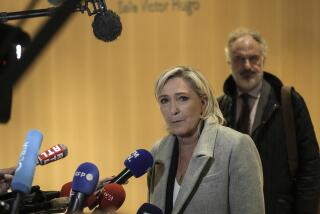North Prosecutors Call Final Witnesses, Aim to Show He Had Financial Problems
- Share via
WASHINGTON — Federal prosecutors called the final witnesses in Oliver L. North’s trial in the Iran-Contra affair Friday and sought to convince jurors that the former White House aide was hard-pressed to pay his personal bills until he began managing the financial accounts of the covert Contra aid operation.
Mary Dix told jurors that, when she began working as director of administration at the National Security Council in 1984, the retired Marine lieutenant colonel often demanded quick reimbursement for his work expenses and “would get very upset if we didn’t have the cash right there.”
His frequent demands ended the following year, she said, about the time that prosecutors have shown that North gained access to a large cash “operational fund” for the Contras. Deposits were made into the fund by his associate, Richard V. Secord, and Contra leader Adolfo Calero to support Nicaraguan rebel activities.
‘Didn’t Have Enough Cash’
Before then, when no cash was on hand to pay his cab fares and other out-of-pocket expenses, “I would hear him yelling: ‘Mary, Mary!’ because he didn’t have enough cash for gas or for lunch money,” Dix said. “ . . . Lots of times I gave him some of my own cash.”
Dix also said North told her that “his credit cards were charged to the max.”
North, during six days on the witness stand, insisted that he never misused any portion of the operational fund for personal purposes. Among the 12 felony counts against him are charges that he accepted an elaborate $13,800 home security system as an “illegal gratuity” from Secord and that he illegally converted to his own use $4,300 in Contra traveler’s checks that were supposed to cover expenses associated with his secret support of the Nicaraguan rebels.
Dix, the NSC’s administrative officer from 1984 to 1988, said North sometimes told her that he did not have enough cash to buy gasoline to drive home.
Payment for Van
But another witness, used-car salesman William Howell, testified that North made a large cash payment on a van he was buying. He said that in October, 1985, North paid off a $3,038 balance on the purchase in cash. Howell said North told him that he had gotten the money from the White House credit union.
Earlier this week, prosecutors introduced records showing that on the same day North had visited Secord’s office in suburban Virginia, where he often obtained cash for Contra-related expenses and which is about a mile from the car dealer’s lot.
North has testified that he got the money for the van payment from a family cash box he kept at home to pay for household expenses. He said he set up the cash hoard with a settlement from an auto accident 23 years ago, usually kept about $15,000 in it and replenished it occasionally.
With the completion of the presentation of evidence, the trial recessed until Tuesday, when the attorneys will begin delivering their closing arguments. The jury is expected to begin deliberating North’s fate Thursday.
Testimony From Banker
Friday, the prosecution elicited testimony about other personal benefits that it contends North received from his role in directing covert aid for the Contras and arms sales to Iran.
Willard I. Zucker, a Geneva banker who set up overseas bank accounts for Secord and an associate, Albert A. Hakim, to use for Iranian arms sales, testified about a meeting he had with North’s wife, Betsy, on March 6, 1986.
Zucker said Secord and Hakim directed him to meet with Betsy North about setting up an educational fund for the Norths’ children. Zucker told jurors that Betsy North took a train to Philadelphia to meet with him after he told her that an unidentified client had asked him “to obtain information about her children and their ages to see whether there was some possibility of assisting with their education.”
Zucker’s testimony was cut short after U.S. District Judge Gerhard A. Gesell summoned attorneys to a private “bench conference” out of earshot of the jury and courtroom spectators.
Another witness, Stephen K. Berry, a former congressional attorney, testified that North had told congressmen at the White House in 1986 that he had installed a home security system “at his expense” when the government refused to do it. Trial testimony has shown that Secord financed installation of the electronic gate and alarm apparatus.
More to Read
Sign up for Essential California
The most important California stories and recommendations in your inbox every morning.
You may occasionally receive promotional content from the Los Angeles Times.













